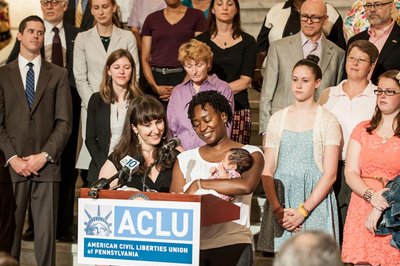Republican Gov. Tom Corbett has declined to appeal yesterday’s ruling legalizing marriage equality in Pennsylvania.
Corbett announced Wednesday that an appeal was infeasible.
“Given the high legal threshold set forth by Judge Jones in this case, the case is extremely unlikely to succeed on appeal,” the governor said. “Therefore, after review of the opinion and on the advice of my Commonwealth legal team, I have decided not to appeal Judge Jones’ decision.”
“We applaud the governor for letting the constitutional principles of freedom and equality ring throughout Pennsylvania by allowing loving same-sex couples to marry,” said Witold Walczak, legal director of the ACLU of Pennsylvania, and Mark Aronchick of Hangley Aronchick Segal Pudlin & Schiller in a joint statement. “As the judge noted, we are a better people than the marriage ban and the governor’s historic decision not to appeal will be an enduring legacy.”
“We sincerely thank Gov. Corbett for allowing this judgment to stand. Words cannot express what this means to the loving couples and families in Pennsylvania who have waited so long to be recognized,” added Equality Pennsylvania director Ted Martin. “Marriage matters to all families, and we rejoice with them today. We also understand that what matters is not that we share the exact same beliefs with everyone in the commonwealth, but that we respect each others differences and treat everyone equally. That is why we appreciate what Gov. Corbett did today and we hope that we will be able to work together to continue to build bridges of understanding. Thank you for letting love win.”
Human Rights Campaign President Chad Griffin also applauded the decision.
“Breaking down this dark wall of discrimination in the Keystone State strengthens our ever-growing momentum as we continue to expand the marriage-equality map,” Griffin said.
The decision came one day after the highly anticipated ruling by U.S. District Court Judge John E. Jones 3d, finding that Pennsylvania’s ban on same-sex marriage is unconstitutional.
An immediate stay was not issued with the ruling, so same-sex couples may began applying for marriage licenses immediately across Pennsylvania.
Jones’ ruling was a scathing condemnation of the 1996 marriage law, which he ultimately found violated couples’ due-process and equal-protection guarantees. The judge found that sexual orientation discrimination is deserving of a heightened-scrutiny review — a stricter constitutional evaluation.
“The issue we resolve today is a divisive one,” the judge wrote. “Some of our citizens are made deeply uncomfortable by the notion of same-sex marriage. However, that same-sex marriage causes discomfort in some does not make its prohibition unconstitutional. Nor can past tradition trump the bedrock constitutional guarantees of due process and equal protection.”
Since last summer’s seminal U.S. Supreme Court ruling dismantling the federal ban on same-sex marriage, every federal or state judge who has heard a challenge to a state ban has found it to be unconstitutional; Jones was the 14th consecutive judge to do so.
Rulings are stayed pending appeal in seven states; appeals are also ongoing in four states where judges ruled the state bans cannot prevent recognition of legal out-of-state marriages. Same-sex marriage is currently legal in 18 states and Washington, D.C.
The latest decision came in Whitewood v. Wolf, the first of several lawsuits filed last year in Pennsylvania following the Supreme Court finding. The case was filed by the American Civil Liberties Union of Pennsylvania on behalf of 11 same-sex couples, two children and a widow.
The suit was filed July 9 by the ACLU, along with firm Hangley Aronchick Segal Pudlin & Schiller, based in Philadelphia. Original defendants included Corbett, Health Secretary Michael Wolf, Attorney General Kathleen Kane and two registers of wills in Washington and Bucks counties, who denied marriage licenses to same-sex couples.
Jones dismissed Corbett and Kane, who declined to defend the state’s ban, and Wolf, whose department oversees marriage records, was named the primary defendant.
The lead plaintiffs were Deb and Susan Whitewood of Bridgeville, just outside of Pittsburgh, who have been together for 23 years. The Whitewoods’ two teenager daughters were also plaintiffs, along with 10 other couples and one widow.
The state originally asked Jones to dismiss the case, and he refused in November, setting a trial date for June. But, this spring, both parties agreed that, with the state offering no witnesses, the case could be decided on the briefs alone.
The plaintiffs put forth declarations from all of the couples, as well as testimony about the wide-ranging harms of marriage inequality by a handful of experts.
Whitewood was the first of several cases filed against the state law last summer. Earlier this month, a federal judge in Philadelphia heard oral arguments in Palladino v. Corbett, which specifically challenges the law’s prohibition against recognition of out-of-state marriages.
